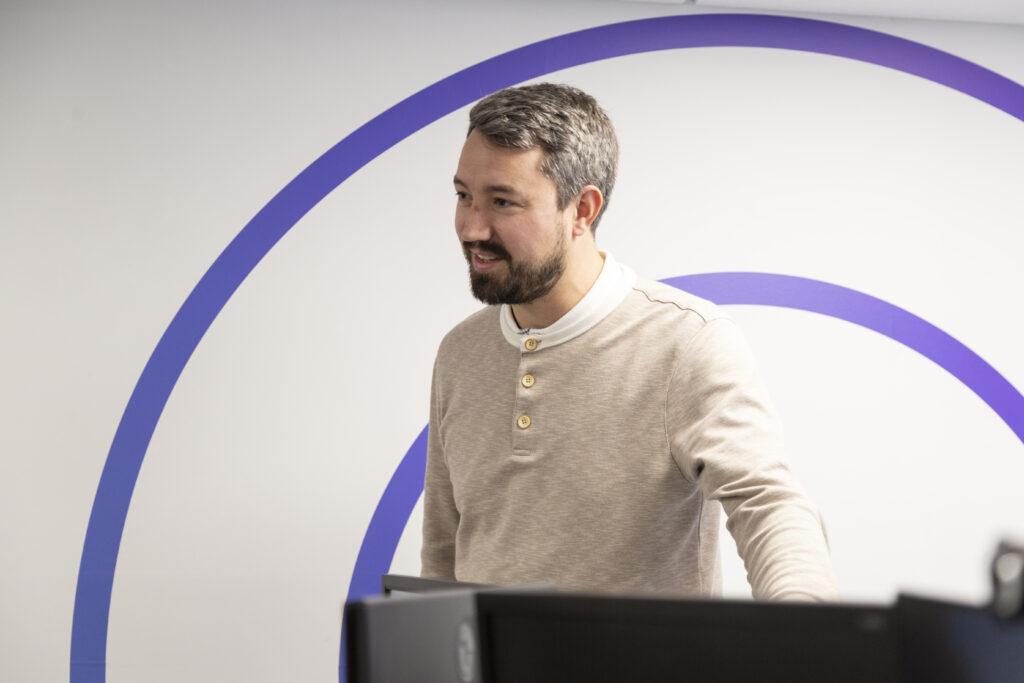The world of cyber security is ever-changing, and as we settle into 2024, the business landscape faces new challenges and opportunities with key cyber security trends. This blog explores the top seven cyber security trends of 2024 and their impact on current and future defence strategies.
One significant aspect to consider is the vulnerability of businesses in this digital age. With organisations often pressured by resources, they find themselves increasingly at risk of cyber threats. This underlines the importance of healthy and flexible cyber security measures.

1. Artificial Intelligence
The evolution of Artificial Intelligence (AI) takes centre stage as a pivotal cyber security trend in 2024. AI and automation offer promising advantages and tough challenges. AI technology enables innovative features like facial recognition and automatic threat detection, enhancing the speed and accuracy of data analysis and response mechanisms. This empowers organisations to identify and mitigate potential security breaches proactively.
However, AI is also being exploited in cyber-attacks, including sophisticated social engineering attacks and automated malware that adapts to avoid detection. This dual role of AI in cyber security demands constant awareness and invention in defensive strategies.
2. The Internet of Things (IoT)
The Internet of Things (IoT), the system of connected physical devices, presents a growing challenge in cyber security. As the number of IoT devices rise, the likeliness for cybercrime increases. Each connected device represents a potential entry point for cyber threats, increasing the probability of data breaches.
In addition, the rollout of 5G networks introduces security challenges, with IoT hardware as a primary target. While IoT offers convenience and modernisation, it also opens new avenues for cyber-attacks.
3. Ransomware
Ransomware remains a substantial cyber security concern. These attacks involve malicious software that encrypts data, with attackers demanding payment for the decryption key. The probable rise of Ransomware-as-a-Service (RaaS) in 2024, where ransomware is rented to others, could lead to increased attacks.
Robust cyber security measures, including secure data backups, staff training, and advanced threat detection systems, are fundamental to combat ransomware threats.

4. Cloud Security
Cloud security is another major trend for 2024. As organisations adopt multi-cloud and hybrid cloud computing, ensuring security across diverse locations becomes crucial. Cloud services providers like Microsoft and Google enhance their security features, but security gaps can still exist due to user errors or inadequate security measures.
If you have or are planning on migrating to the cloud, securing the cloud environments against unauthorised access and ensuring data integrity is vital, especially with the increasing reliance on cloud services in distributed work environments.
5. Remote Working Cyber Security
With the advance in remote and hybrid work models, remote working cyber security takes centre stage. Employees working from various locations may use less secure networks, raising the risk of data exposure. Implementing multi-factor authentication (MFA), Virtual Private Networks (VPNs), and automated patching are essential measures for organisations to secure remote work environments.
6. Mobile Cyber Security
Mobile devices, including smartphones and tablets, are becoming fundamental to our digital lives. However, they also pose security risks, with sensitive data often less protected. Cyber-attacks on mobile devices include phishing scams, malicious apps, and exploits targeting security flaws. Robust mobile cyber security measures, such as regular updates and user education, are vital.

7. Multi-Factor Authentication (MFA)
MFA emerges as an essential component in cyber security. It adds a chief layer of protection, especially in environments where compromised passwords or unsecured networks pose dangers. MFA is expected to become a model security requirement as cyber threats evolve.
Final Thoughts
In conclusion, businesses must adapt to the key cyber security trends of 2024. Vigilance, advanced security technologies, and cyber awareness among staff are essential. Cyber security is no longer just an IT concern; it’s integral to organisational resilience and sustainability in a unified world.
If your business wants to discover tailored cyber security solutions, consider booking a FREE Cyber Security Consultation with Qlic IT experts.





